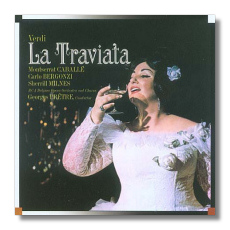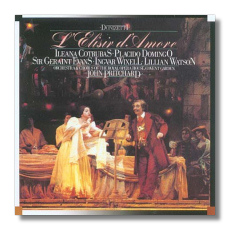
The Internet's Premier Classical Music Source
Related Links
- Latest Reviews
- More Reviews
-
By Composer
-
Collections
DVD & Blu-ray
Books
Concert Reviews
Articles/Interviews
Software
Audio
Search Amazon
Recommended Links
Site News
 CD Review
CD Review
Masterworks Opera

Giuseppe Verdi
La traviata
- Montserrat Caballé (Violetta)
- Carlo Bergonzi (Alfredo)
- Sherrill Milnes (Giorgio)
- Dorothy Krebill (Flora)
- Nancy Stokes (Annina)
RCA Italiana Opera Orchestra & Chorus/Georges Prêtre
RCA Red Seal 82876-70778-2 ADD 2CDs: 71:38, 53:09


Gaetano Donizetti
L'Elisir d'Amore
- Ileana Cotrubas (Adina)
- Placido Domingo (Nemorino)
- Geraint Evans (Dulcamara)
- Ingvar Wixell (Belcore)
- Lillian Watson (Gianetta)
Orchestra & Chorus of the Royal Opera House, Covent Garden/John Pritchard
Sony Classical S2K96458 ADD 2CDs: 70:30, 53:58
Among the recently reissued titles from newly-formed Sony BMG Masterworks are operas which previously appeared either on RCA Red Seal or Sony Classical. These reissues have been given the name "Masterworks Opera," and in addition to the Traviata and Elisir reviewed here, there's a familiar Bohème (Caballé and Domingo, with Solti), an equally familiar Tosca (Leontyne Price and Domingo, with Mehta), an older Rigoletto (Moffo, Merrill, and Kraus, again with Solti), and Hänsel und Gretel (von Stade and Cotrubas, with Pritchard). These reissues are "sleek," which means that the packaging is on the frugal (and fragile) side. Librettos are not included, but taking a hint from Universal Classics' "Compact Opera Collection," texts and translations are available as PDF files on one of the CDs; you can either print them out or view them on your computer. Booklets are included which give the cast listings, plot summaries, and virtually microscopic reproductions of the recording session photos which appeared in the original LP sets. (I'm one of those backwards people who thought that LPs generally were more physically satisfying to own and enjoy than CDs.)
RCA's handsome Traviata was recorded in their studios in Rome during the second half of June 1967. It still has much to offer. This was one of the first recordings to offer the score complete; none of the "traditional" cuts are made. Alfredo's character becomes more sympathetic when we hear "Oh, mio rimorso," and the second verse of "Addio del passato" provides a needed point of contemplation for listeners – otherwise, the final act can seem too precipitous. Granted, the complete "Ah, gran Dio, morir si giovine" does drag on a bit, with some not very distinguished bridging material from the composer.
The three principals were on the young side – and in excellent voice – in 1967. (This is one of those Traviatas in which Giorgio Germont is younger than his son!) Caballé's singing can be heartbreakingly beautiful (listen to "Alfredo, Alfredo" at the start of the second act finale), and there are very distinguished moments such as the palpable fright in her voice when she looks in her mirror and sees how pale she is in the first scene. Otherwise, she hardly seems willing or able to sound like a sick or dying woman except at the opera's very end. Also, this is not a Violetta who seems particularly gay (in the old-fashioned sense of the word). "Sempre libera" is cleanly sung, and there are moments of warm laughter in her portrayal, but at no point does one feel that Violetta is a sparkling and vivacious courtesan. In other words, hers is a serious and rather one-dimensional Violetta, but the superior quality of the vocal production offers plenty of compensation.
Similarly, Bergonzi sounds youthful, but he is not really impetuous, and little of Alfredo's wounded pride and thoughtlessness come through. The only time he allows himself to express negative emotions is when he hurls his gambling winnings at Violetta with a not very convincing snarl. Still, his singing is absolutely gorgeous, and the inclusion of both verses of "Oh mio rimorso" is more welcome than it might otherwise be. Milnes has plenty of authority as the elder Germont, but in trying to "mature" his voice he perhaps sounds more imperious than is necessary. In his Act Two scene with Violetta he is snobbish, even brutal at one moment, and then all generosity (when she has given in!) at the next. The supporting cast is variable, with a few weak contributions, and the chorus badly needs someone like a Robert Shaw to pull them out of routine. Prêtre rushes some of the music, but he's quite sympathetic overall. The engineering is rich and warm rather than brilliant. If one values beauty of singing above everything else, this La traviata receives a strong recommendation.
Sony's Elisir, recorded a decade later, is an international affair, with not a native Italian in the cast. This recording is more complete than most – the majority of the "traditional" cuts have been opened up – although only the Decca version (Sutherland and Pavarotti, with Bonynge) includes everything. Again, this is a good thing, because Donizetti's music is a sparkling delight from beginning to end, and the cumulative effect of the cuts is to make the plot even more nonsensical than it already is.
Among the principals, it is Domingo who sounds the most comfortable. By 1977 he was singing heavy roles such as Otello, and it is fortunate that he was able to lighten his voice for Nemorino. Nevertheless, a more heroic timbre creeps in from time to time – for example, in (not inappropriately) Nemorino's second act duet with Belcore. Domingo may not be a comedian, and he may not project the unaffected sincerity some other tenors brought to this role, but this is a very creditable (and finely sung) performance. Once she is past her opening aria about "Tristano e Isotta," where her coloratura singing is cautious, Cotrubas is a bright and enjoyable Adina. With her slightly pinched tone, she sounds someone who holds a tiny ice cube in her heart until the very end, when she melts it just for Nemorino. Wixell's Belcore preens a little, as is only right, but the handsomeness of his singing justifies the character's reputation as a ladies' man. Some critics like Evans's Dulcamara more than I do. I find him pompous – less sympathetic than Belcore, really. Evans is hard-pressed to get all of the words out of his mouth in the patter passages, and his voice is no longer in good shape; sometimes he seems to be barking more or less on pitch. A decade earlier he starred in one of the great recordings of Verdi's Falstaff. This is a falling-off from that high standard, but still an acceptable performance, with personality trumping musical values. There are better Dulcamaras on CD, however. Pritchard's conducting is pushy; he seems concerned about being upstaged by the singers.
The chorus is hyperactive, interjecting laughter, sighs, applause, and other unnecessary noises, as if they were acting in suburban dinner theater. This quickly becomes tiresome. Was it thought that the listeners perhaps were not smart enough to "get it"? It makes no sense to have the crowd chuckle indulgently at Dulcamara's gaffe about being known "throughout the universe, and… and… and in other places" and then to have them clamor for his bogus elixir five minutes later.
The sound on the LPs was strangely unrealistic, and it is no less so on CD. The singers and the orchestra sound as if they have been recorded in two different environments – a more echo-y one for the singers – and then mixed together after the fact. The Decca recording from 1970 has much more natural sound.
Copyright © 2005, Raymond Tuttle




















